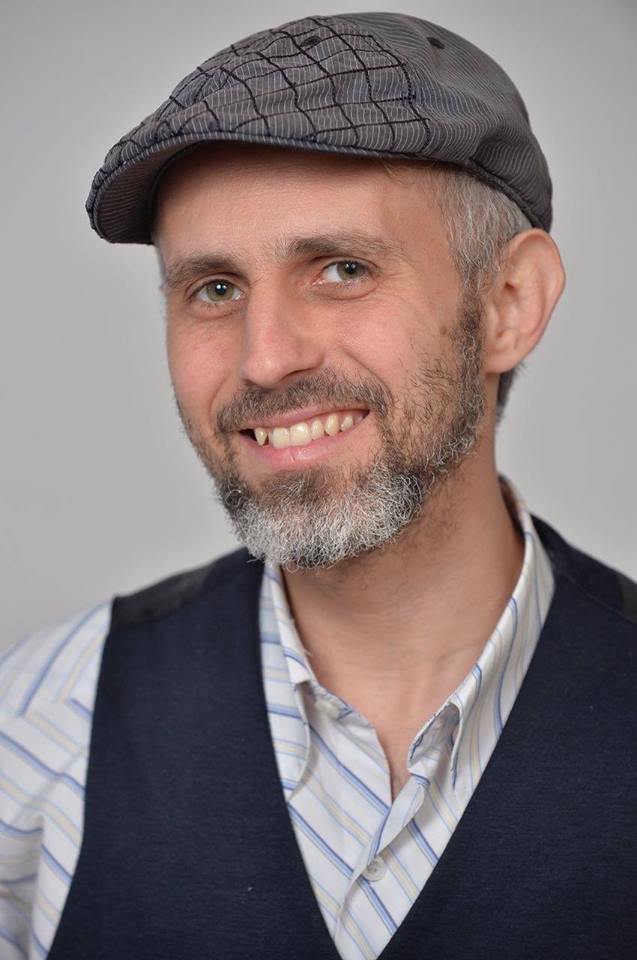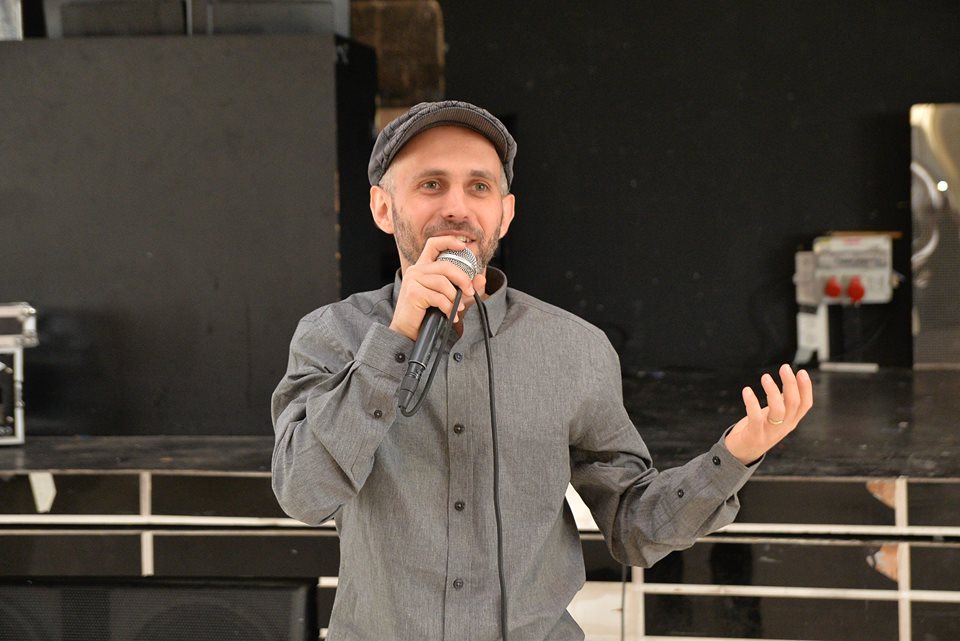"Everyone Can Find a Lucrative Job and Enjoy What They Do"
Desperate to find a good job? Emil Rosenblatt has good news for you. Everyone can find their dream job — if they just learn a few things. The key? Never give up. 'There's no one who doesn't have their moment,' he says, sharing his own journey of return.
 Emil Rosenblatt
Emil RosenblattHave you ever hesitated to send your resume to a certain workplace just because you're afraid you might not fit such a 'big' role? Or maybe you've experienced a case where you can perform a certain job, but the fact that you're not well-versed in the field and haven't acquired the necessary experience stopped you? Struggling to find a job that matches your skills, or have been idle at home for a long (perhaps too long) time?
Well, Emil Rosenblatt (34), a married father of a daughter from Hatzor HaGlilit, who serves as the Marketing and Business Development VP at a 'boutique' software company in the north, and calls himself a 'high-tech matchmaker', has a lot to say to you.
In his new and particularly fascinating project, published on various social networks, Rosenblatt offers practical and efficient solutions for job seekers of all kinds. The motto at its base is helping through understanding the candidate's needs and having deep knowledge of their talents and life experience. "When I need to help someone who is stuck in terms of career and respectable occupation, the first thing I do is listen to them. When I listen, I learn to identify not what the person claims they lack, but what they don't know they have. Many people think they're not suitable for a certain field, just because they lack the relevant experience."
"Take for example a yeshiva student, who has always studied Torah. He might think there are not many things he can engage in because he truly lacks the relevant field experience. He just forgets that the brain used in studying the Talmud can reach incredible heights if developed correctly. The mathematical thinking of someone who studies Talmud is something else entirely, and for such people, it becomes much easier to learn mathematical subjects. This is also why, in recent years, more and more Haredim are integrating into high-tech."
So why do we still see many talented people who can't reach coveted positions? "One reason is they simply don't know how to 'market' what they have and who they are, properly. When you go to a job interview, you need to communicate and exude confidence. Come with a smile, and be happy. Yes, even if you haven't worked for more than half a year. So what? It can change in a moment if Hashem wills it. Be who you are, and appreciate who you are."
"Just because you're currently 'stuck', doesn't mean you aren't a whiz in a certain field"
Unfortunately, not everyone knows how to do this, and that's where Rosenblatt comes into the picture. "A good career advisor's role is to reflect the candidate's potential on one hand, and provide empowering and constructive criticism on the other. For example, many candidates think they need to pretend to fit into the coveted role, when in some cases, what impresses the recruiter is actually honesty. It's not shameful to admit to a recruiter that you're shy and that's why it's hard to talk about yourself, but 'if you give me technical questions, I'm very good at that.' And another point, people simply don't know how to interview. Just having the confidence that you're talented and good at what you do isn't enough; you need to know how to express it outwardly."
And what about those who have already given up trying to 'market' themselves the right way?
"First, I'll address the question from a faith perspective. If a person reached a state of despair, no matter the field, it's important to understand it's no coincidence. Hashem wants you to learn something from that. It's a given situation, and fighting it won't help. Additionally, just because you're currently 'stuck' in a certain state or mindset doesn't mean you're not a 'whiz' in a particular field.

"Right now, heaven decided to test you with the challenge of sustenance and prevent you from the desired position. So what? You have to remember that it's temporary because 'there's no one who doesn't have their hour'. No one can't integrate optimally into the job market, earn well and also enjoy what they do."
His LinkedIn page is filled with fans from all styles and backgrounds. Over 21,000 people follow his posts closely, and enthusiastic responses are not far behind. As part of the new initiative, Rosenblatt 'matches' job seekers with career advisors who provide subsidized guidance tailored to the 'matched' individual's socio-economic status. "Fortunately, many HR managers, career advisors, and other experts in the field have joined this initiative—naturally good people who understand the need and are willing to help. All that's left for the candidate is to take the opportunity and accept this help."
Practical tips you can share with readers before they seek such help?
"Firstly, it's important for a person to know how to define what they want. If they don't know that, they must get advice, and a good professional can help them get there within 2-3 meetings. And, of course, it's important to take time alone and pray about it, asking Hashem to help you be precise. Recruiters are very busy people, and you need to come prepared to your meeting with them.
"Secondly, it's crucial to build a resume correctly, but no less important are the initial phone conversation, appearance, and body language. You need to know how to present yourself, avoid sounding tired, banal, or boring, dress appropriately for the interview, and create the perfect first impression in two to three minutes.
"My third piece of advice is honesty. Those who say in an interview 'I'm nervous', 'I don't know where to start', 'I'm not good at presenting myself', etc., have no idea what that does. First, it relieves 50 percent of your nervousness. Besides, it encourages openness and works miracles for the other side. Honesty is a muscle you need to develop, just like faith, and it opens the gates of heaven, taking people to completely different places."
About Return: "For three entire years, I prayed that Hashem would merit me to wear a kippah"
Rosenblatt began his journey in the high-tech world at age 26, alongside another no less formative journey — a journey of return. "It all started at age 13 when I became acquainted with Joseph Murphy's book 'The Power of Your Subconscious Mind'. This book occupied me greatly, and as a result, I researched various methods and philosophies, both Western and Eastern," Rosenblatt recalls. "Zen, meditations... you could say I tasted almost everything except Judaism. I had very great aspirations to change the world, and for this reason, I even enrolled in philosophy studies at the University of Haifa. I thought that would make me a better person, but I was wrong. What they teach you there are just theories."
After finishing his degree, Rosenblatt also trained in coaching, while simultaneously taking his first steps in the high-tech world. And then his wife's brother, his 48-year-old brother-in-law, passed away. "That was the trigger that led me, for the first time in my life, to meet religious people and begin my spiritual journey towards Judaism. As was my habit, I researched this path a lot too, and among others, I encountered the teachings of R' Nachman of Breslov. My approach to Judaism changed completely there; I realized that the main thing is to break the pride within me, and of course, I have a long way to go, and every day is a new struggle."

Why?
"Because I suddenly realized that Judaism, including R' Nachman's teachings, actually answers everything I was looking for. With R' Nachman, I discovered coaching tools that build you up with good qualities, and help you cope with life in a way no philosophical theory can."
And what did you actually do with this discovery?
"Well, you could say that in this regard, the Torah was acquired by me through much effort and study. Although after six months of observing commandments, I was already ready to fully embrace and become Haredi. But today I understand that it doesn't happen immediately, and it's good that it happens gradually. If it had happened immediately, I'm sure I would have quickly turned into someone who detests secularists and possibly even religious people.
"For three years, I prayed with tears to wear a kippah on my head, and today I know it's genuine. Because when a person builds everything with prayer, it has no chance of falling apart. It doesn't matter what trial they have to go through on the way."
Nowadays, Rosenblatt strives to maintain a regular schedule of lectures, sets times for Torah study alongside his busy agenda, and doesn't forget to do everything with love. "Obviously, I would like to sit in a kollel all day and study Torah, but today, I understand that Hashem placed me where I am to bring Jews closer from my position, with the talents He has gifted me. Thank Hashem, I've been imbued with excellent verbal skills, an analytical ability to understand one thing from another, and love for my fellow man. Many people who meet me at lectures I give struggle to understand how I manage to convey great love without expressing it physically. They ask how I convey love, but to me, it's clear. I simply love. No physical contact is needed to love; what you need is empathy, care, and a genuine desire for the other's wellbeing. That's what I strive with all my might to do in my professional work, and from this place, people are drawn to the Torah and show interest in it, without you saying a thing about it."

